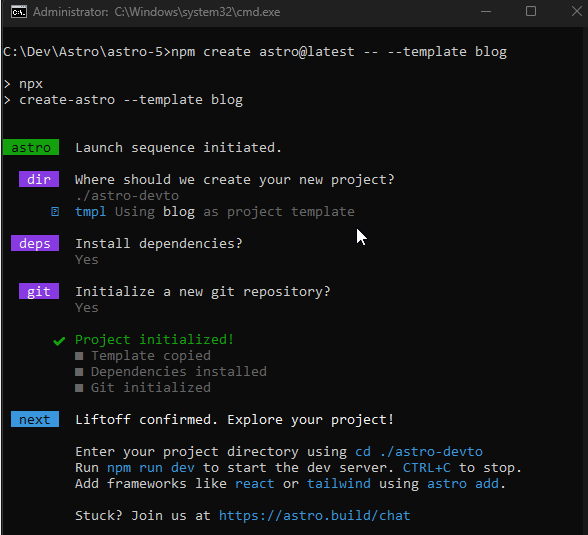AstroJS:轻松将 Dev.to 集成到内容中
使用博客模板启动一个新项目
npm create astro@latest -- --模板博客

我们启动应用程序
cd [项目名称] && npm run dev


从 Astro 5 开始,引入了内容层 API,该工具允许您在网站构建期间从任何来源加载数据,并通过简单、安全类型的 API 访问它。
此 API 可以灵活地处理来自各种来源的内容,例如本地 Markdown 文件、远程 API 或内容管理系统 (CMS)。通过使用特定模式定义内容“集合”,您可以有效地构建和验证数据。此外,内容层 API 还提高了内容较多的网站的性能,加快了构建时间并减少了内存使用量。
https://astro.build/blog/astro-5/
Astro 的内容层 API 将 dev.to 帖子集成到您的网站中
您可以使用 Astro 的内容层 API 将 dev.to 帖子集成到您的网站中。尽管 dev.to 没有特定的加载器,但您可以创建一个自定义加载器来使用其 API 并将帖子存储在 Astro 的内容集合中。
要实现此目的,请按照以下步骤操作:
1.配置对dev.to API的访问



在项目根目录创建 .env 文件
.env
DEV_TO_API_URL=https://dev.to/api/ DEV_API_KEY=tu_clave_de_api
2.在Astro中定义集合
在 src/content.config.ts 中,使用内容层 API 为 dev.to 帖子定义一个集合:
使用 Astro 模板创建项目时,它会自动生成博客的集合
srccontent.config.ts
import { glob } from 'astro/loaders';
import { defineCollection, z } from 'astro:content';
const blog = defineCollection({
// Load Markdown and MDX files in the `src/content/blog/` directory.
loader: glob({ base: './src/content/blog', pattern: '**/*.{md,mdx}' }),
// Type-check frontmatter using a schema
schema: z.object({
title: z.string(),
description: z.string(),
// Transform string to Date object
pubDate: z.coerce.date(),
updatedDate: z.coerce.date().optional(),
heroImage: z.string().optional(),
}),
});
export const collections = { blog };
现在我们为 Dev.to 文章创建集合
const devTo = defineCollection({
loader: async () => {
const headers = new Headers({
"api-key": DEV_API_KEY,
});
const posts = await fetch(`${DEV_TO_API_URL}articles?username=jmr85`, {
headers: headers
}).then(res => res.json());
return posts.map((post: any) => ({
id: post.slug,
title: post.title,
description: post.description,
pubDate: new Date(post.published_at),
updatedDate: post.edited_at ? new Date(post.edited_at) : null,
heroImage: post.cover_image || post.social_image,
url: post.url,
}));
},
schema: z.object({
title: z.string(),
description: z.string(),
pubDate: z.coerce.date(),
updatedDate: z.coerce.date().optional(),
heroImage: z.string().nullable(),
url: z.string(),
}),
});
export const collections = { blog, devTo };
这是
的完整代码
srccontent.config.ts
DEV_TO_API_URL=https://dev.to/api/ DEV_API_KEY=tu_clave_de_api
查看 schema 中字段定义的详细信息,字段必须与 Astro 模板的博客集合相匹配,然后添加 Dev.to 帖子集合特有的字段。它们必须与数据类型具有相同的名称,这样我们就可以将 Astro 模板中的 Markdown 帖子与博客部分中 Dev.to 中的 Markdown 帖子“合并”。
3. 在您的页面上使用帖子:
您现在可以使用 getCollection 访问 Astro 组件或页面中的 dev.to 帖子:
原文:
srcpagesblogindex.astro
import { glob } from 'astro/loaders';
import { defineCollection, z } from 'astro:content';
const blog = defineCollection({
// Load Markdown and MDX files in the `src/content/blog/` directory.
loader: glob({ base: './src/content/blog', pattern: '**/*.{md,mdx}' }),
// Type-check frontmatter using a schema
schema: z.object({
title: z.string(),
description: z.string(),
// Transform string to Date object
pubDate: z.coerce.date(),
updatedDate: z.coerce.date().optional(),
heroImage: z.string().optional(),
}),
});
export const collections = { blog };
现在我们将使用内联条件对帖子进行迭代,如果是 devto,将重定向到网站上文章的 url https://dev.to/{username}/{slug-article }
{
posts.map((post) => (
<li>
<a href="%7Bpost.collection" post.data.url :>
<img 宽度={720} 高度={360} src={post.data.heroImage} alt="" />
<h4>
</h4>
<p><img src="/static/imghw/default1.png" data-src="https://img.php.cn/upload/article/000/000/000/173540174627117.jpg" class="lazy" alt="AstroJS : Integra contenido de Dev.to de manera sencilla"></p>
<p>存储库:https://github.com/jmr85/astro-devto</p>
</a>以上是AstroJS:轻松将 Dev.to 集成到内容中的详细内容。更多信息请关注PHP中文网其他相关文章!

热AI工具

Undresser.AI Undress
人工智能驱动的应用程序,用于创建逼真的裸体照片

AI Clothes Remover
用于从照片中去除衣服的在线人工智能工具。

Undress AI Tool
免费脱衣服图片

Clothoff.io
AI脱衣机

Video Face Swap
使用我们完全免费的人工智能换脸工具轻松在任何视频中换脸!

热门文章

热工具

记事本++7.3.1
好用且免费的代码编辑器

SublimeText3汉化版
中文版,非常好用

禅工作室 13.0.1
功能强大的PHP集成开发环境

Dreamweaver CS6
视觉化网页开发工具

SublimeText3 Mac版
神级代码编辑软件(SublimeText3)
 神秘的JavaScript:它的作用以及为什么重要
Apr 09, 2025 am 12:07 AM
神秘的JavaScript:它的作用以及为什么重要
Apr 09, 2025 am 12:07 AM
JavaScript是现代Web开发的基石,它的主要功能包括事件驱动编程、动态内容生成和异步编程。1)事件驱动编程允许网页根据用户操作动态变化。2)动态内容生成使得页面内容可以根据条件调整。3)异步编程确保用户界面不被阻塞。JavaScript广泛应用于网页交互、单页面应用和服务器端开发,极大地提升了用户体验和跨平台开发的灵活性。
 谁得到更多的Python或JavaScript?
Apr 04, 2025 am 12:09 AM
谁得到更多的Python或JavaScript?
Apr 04, 2025 am 12:09 AM
Python和JavaScript开发者的薪资没有绝对的高低,具体取决于技能和行业需求。1.Python在数据科学和机器学习领域可能薪资更高。2.JavaScript在前端和全栈开发中需求大,薪资也可观。3.影响因素包括经验、地理位置、公司规模和特定技能。
 如何使用JavaScript将具有相同ID的数组元素合并到一个对象中?
Apr 04, 2025 pm 05:09 PM
如何使用JavaScript将具有相同ID的数组元素合并到一个对象中?
Apr 04, 2025 pm 05:09 PM
如何在JavaScript中将具有相同ID的数组元素合并到一个对象中?在处理数据时,我们常常会遇到需要将具有相同ID�...
 JavaScript难以学习吗?
Apr 03, 2025 am 12:20 AM
JavaScript难以学习吗?
Apr 03, 2025 am 12:20 AM
学习JavaScript不难,但有挑战。1)理解基础概念如变量、数据类型、函数等。2)掌握异步编程,通过事件循环实现。3)使用DOM操作和Promise处理异步请求。4)避免常见错误,使用调试技巧。5)优化性能,遵循最佳实践。
 如何实现视差滚动和元素动画效果,像资生堂官网那样?
或者:
怎样才能像资生堂官网一样,实现页面滚动伴随的动画效果?
Apr 04, 2025 pm 05:36 PM
如何实现视差滚动和元素动画效果,像资生堂官网那样?
或者:
怎样才能像资生堂官网一样,实现页面滚动伴随的动画效果?
Apr 04, 2025 pm 05:36 PM
实现视差滚动和元素动画效果的探讨本文将探讨如何实现类似资生堂官网(https://www.shiseido.co.jp/sb/wonderland/)中�...
 JavaScript的演变:当前的趋势和未来前景
Apr 10, 2025 am 09:33 AM
JavaScript的演变:当前的趋势和未来前景
Apr 10, 2025 am 09:33 AM
JavaScript的最新趋势包括TypeScript的崛起、现代框架和库的流行以及WebAssembly的应用。未来前景涵盖更强大的类型系统、服务器端JavaScript的发展、人工智能和机器学习的扩展以及物联网和边缘计算的潜力。
 console.log输出结果差异:两次调用为何不同?
Apr 04, 2025 pm 05:12 PM
console.log输出结果差异:两次调用为何不同?
Apr 04, 2025 pm 05:12 PM
深入探讨console.log输出差异的根源本文将分析一段代码中console.log函数输出结果的差异,并解释其背后的原因。�...







